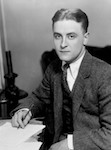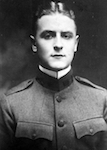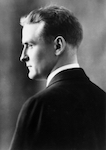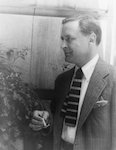




"I know myself," he cried, "but that is all-" - F. Scott Fitzgerald, This Side of Paradise
The American author F. Scott Fitzgerald (1896 - 1940) published his first novel 'This Side of Paradise' (1920) almost 100 years ago. Yet, even though his writing is firmly rooted in the era he lived in - the heyday of the Roaring Twenties - his works still feel contemporary. The age of the mass media had just begun when Fitzgerald started his career, but still he anticipated how omnipresent images would impact the way we lead our lives. Beauty matters to his heroes. Glittering surfaces attract them. Yet more often than not, their journeys end in bitter disappointment when they realize that the world does not live up to their ideals - neither in an aesthetic nor in an ethical sense.
This site provides an annotated bibliography of Fitzgerald's works and offers an overview of his literary work and its movie adaptations, the biographies and other books about his writing as well as links to other websites dedicated to Fitzgerald. For full disclosure, this site participates in Amazon's Associate program and earns a commission on qualifying purchases.
F. Scott Fitzgerald's writing:
The novels
The short stories
Movie scripts and plays
Letters and essays
Books about F. Scott Fitzgerald:
Biographies
Books about Fitzgerald's writings
Novels about Fitzgerald
Fitzgerald Movies:
The movie adaptations
Films with or about Fitzgerald
Links to other recommended Fitzgerald websites
Recently reviewed: 'Zelda - An Illustrated Life' by Eleanor Lanahan
She never dedicated herself fully to either writing, dancing or painting. Yet, Zelda Fitzgerald managed to publish a novel as well as several short stories, received an invitation to perform a solo role in a ballet production of the Royal Ballet of Italy and exhibited her paintings in a gallery in New York. What makes all of this even more remarkable is that she took ballet classes, wrote Save me the Waltz and experienced her most prolific episodes as a visual artist, while undergoing treatment for schizophrenia and coping with the demands of a life permanently in and out of mental institutions. Unfortunately, today's audience can only read her prose, but neither watch her dance nor enjoy her paintings in a museum. To make amends for the latter, Zelda's grand-daughter Eleanor Lanahan published 'Zelda - An Illustrated Life' in 1996, a collection of Zelda's paintings that survived fire and neglect and can still be traced today, accompanied by a biographical sketch as well as an assessment of Zelda's accomplishments as a painter. For anyone who would love to adorn their living rooms with one of Zelda's wildly imaginative paintings, the book is a great consolation price. You get to experience the beauty of her best work, marvel at the determination that enabled her artistic output, yet also wonder about the horror lurking beneath some of the images. What must it have felt like to be catapulted to the top of the world at the age of 20, only to face irreversible decline before turning 30?
Recently reviewed: 'Sometimes Madness Is Wisdom: Zelda and Scott Fitzgerald' by Kendall Taylor
If you exhibit a tendency towards hero worship and if Fitzgerald features prominently amongst your personal collection of demi-gods, you might want to steer clear of Sometimes Madness Is Wisdom. In her account of the time Scott and Zelda Fitzgerald spent with each other, the author Kendall Taylor never flinches when it comes to shining a bright light on the more questionable aspects of the couple's behavior. Wasting their time as carelessly as their money, alienating friends and foes with childish, alcohol-inspired pranks and never embracing their responsibilities as parents, the Fitzgeralds, in particular Scott, come across as spoilt brats who foolishly believed they were somehow exempt from the precepts of ordinary decency. However, as justified as the warts-and-all approach to biography might be, especially to balance the more awe-struck works of Broccoli et al., Taylor goes overboard with details on who may have slept with whom and the drunken antics of everyone involved. In fact, the book is so focused on the debauchery, you start you wonder how Scott got any work done - and what the point of this painstaking research of sordid details was. Ultimately, Scott and Zelda are long gone; what remains is the stories they have told. And our time is probably better spent re-visiting those rather than speculating about the madness their wisdom was distilled from.
Recently reviewed: 'The Thoughtbook of F. Scott Fitzgerald' - the author’s previously unpublished teen diary
In case you are 14 years old, keeping a diary and harboring ambitions to literary fame, you do not need to worry if your journal entries lack style or substance. F. Scott Fitzgerald did not fare much better during this stage of his life as the recently published The Thoughtbook of F. Scott Fitzgerald shows. However, reading the text will also remind you that, if you do manage to become a famous author, then scholars are going to be interested in anything you ever scribbled down, including your teenage thoughts on girls and gossip. That’s why we can now pry into Fitzgerald's private musings on the waxing and waning of his affections, even though they were never meant to be read by anyone but himself. After all, he kept his diary locked in a box under his bed. Perhaps that’s where it should have remained, both to spare Fitzgerald any posthumous embarrassment and today’s reader an hour of solid boredom.
Recently reviewed: 'Temperature' - a previously unpublished short-story by F. Scott Fitzgerald
If any additional proof was needed that Fitzgerald disliked Hollywood, it has just arrived in the shape of his unflattering portrayal of the fictional actress Elsa Halliday in his short story 'Temperature'. The corresponding script had lain dormant in the Princeton library for decades until the editors of The Strand magazine published it in their Q3 2015 edition. There are many ways to enjoy 'Temperature': as the author's thinly disguised love letter to his real-life secretary Frances Kroll, as an exercise in merging the art of script and story writing ('And at this point, as they say in picture making, the camera goes into the house, and we go with it.', is the segue into the main part of the plot) or as a revival of Fitzgerald's skill in crafting romantic tales. After all, the basic premise behind 'Temperature' - love flourishes against a backdrop of illusion and deception - already informed 'The Offshore Pirate', one of his earliest published short-stories. However, more than anything, 'Temperature' is testament to the power of make-believe, not just over the reader's, but even over the writer's mind. In telling the story of a 31-year-old author who, due to a mix-up at the doctor's office, believes himself to be dying of a heart disease, 42-year-old Fitzgerald projected himself into the role of a younger man whose illness turns out to be illusory while he himself would be dead only 18 months after finishing the story.
Recently reviewed: 'Save me the Waltz' by Zelda Fitzgerald
There are sentences in this book that remind the reader instantly of Scott Fitzgerald's prose. Yet, there can be no doubt that he contributed very little, if anything to his wife's first and only novel. Zelda wrote it within six weeks in early 1932, much to the chagrin of Scott who had been working on his forth novel Tender is the Night for several years at that point. He also objected to the fact that Zelda's story was primarily a thinly-veiled autobiographical account, but nevertheless he eventually praised his wife's work. And he was right to do so. Since even though Zelda's use of stilted language sometimes borders on the absurd, her story engrosses the reader as the deeply personal memoir of a woman who was not content to be merely the wife of a famous husband. If nothing else, the book gives testament to her independent spirit and helps the reader understand why - despite all the self-inflicted pain that their marriage had to endure - Scott and Zelda ultimately stayed true to each other until the bitter end.
Recently reviewed: 'The Strange Case of Benjamin Buttons' by David Fincher
Nobody likes to grow old, so a story about a man who is born as an octogenarian and then starts to age in reverse, should be a happy one, right? Yet, director David Fincher leverages Fitzgerald’s awkward plot contrivance to reflect on what truly haunts human existence, namely the passing of time, the fact that every second brings us irreversibly closer to an unknown, yet non-negotiable end point. Right at the beginning of the film there is a pre-amble to the main story about a watch maker who builds a clock for a train station that runs backwards. He wants life’s trajectory to change – and in the movie it suddenly does to show how the man’s son gets resurrected from the trenches of World War I and returns to the moment of his final farewell. Yet, the absurdity of the backward motions, just like the absurdity of Benjamin Button’s Curious Case, make the point that we have to come to terms with life’s finality with particular poignancy.
Imprint - Feedback and suggestions are greatly appreciated.